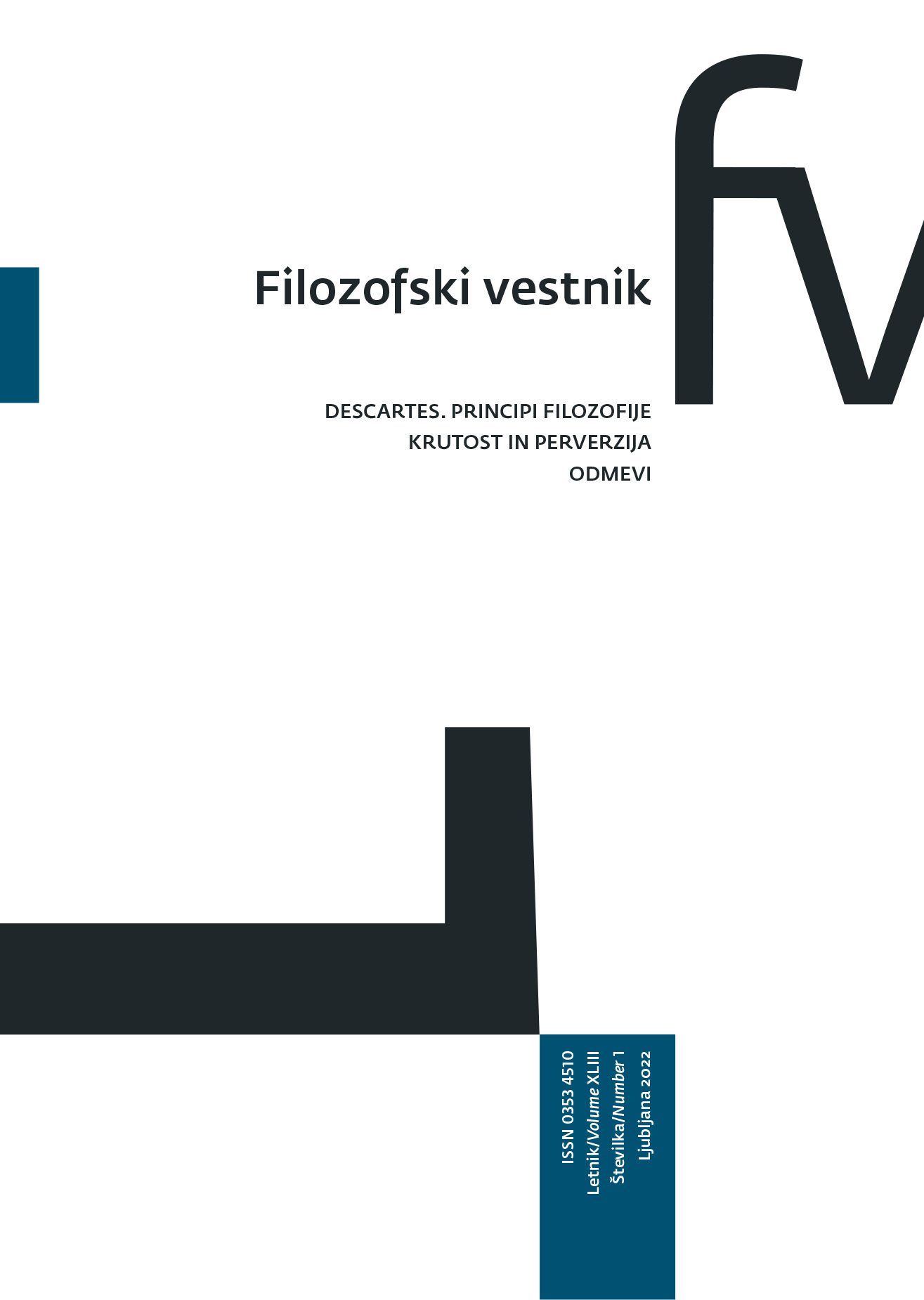A Materialist Theory of Happiness
DOI:
https://doi.org/10.3986/fv.43.1.06Keywords:
happiness, encounter, materialism, automaton, týche, repetition, phallus, Benjamin, LacanAbstract
If we had to identify the most controversial concept today, “happiness” would certainly figure among the main candidates for this role. On the one hand, “happiness” has represented one of the main ethical axes in the history of philosophy – from Greek eudaimonia to Bentham’s “greatest happiness for the greatest number of people.” Ethics was almost inextricably connected with the search for happiness, which was already in Greek synonymous for the “good life”. On the other hand, capitalism today, notwithstanding the general apathy and despair due to the permanent crises of the capitalist system (climate change, pandemics, financial crises, etc.), still legitimises itself with, if not guarantees, at least a promise of happiness. Despite different historical contexts which again and again gave meaning to the concept of happiness, a common denominator can still be identified, which today, in the era of late capitalism, has even gained the status of a cornerstone of our hegemonic image of happiness. Happiness is a question of being. The evocation of happiness usually raises the question of whether one is happy or not, what it means to be happy, and how we become so. Happiness is thus inextricably connected to the question of identity: it is the sensual expression of our being, of what we supposedly are. In contrast to this “ontologisation of happiness”, the article tries to show not only that there is a materialist concept of happiness, but also that the latter bases itself on the primacy of the verb “having” instead of “being”. From a materialist perspective, happiness is something that we have or encounter, and not something that we are. Two references are crucial in this articulation: first, Benjamin’s formulation of happiness from his last essay “On the concept of history”, and second, the Freudian-Lacanian theory of repetition.
Downloads
References
Agamben, Giorgio, »Walter Benjamin in demonsko«, v: Giorgio Agamben, Moč misli, prev. Vera Troha, Ljubljana, Beletrina, 2021, str. 177–201.
Benjamin, Walter, »O pojmu zgodovine«, v: Walter Benjamin, Izbrani spisi, Ljubljana, Studia humanitatis, 1998, str. 215–225.
Bradley, Arthur, Unbearable Life: A Genealogy of Political Erasure, New York, Columbia University Press, 2019.
Cabanas, Edgar in Eva Illouz, Manufacturing Happy Citizen: How the Science and Industry of Happiness Control Our Lives, Cambridge, Polity Press, 2019.
Davies, William, The Happiness Industry: How the Government and Big Business Sold Us Well-Being, London in New York, Verso, 2015.
Dolar, Mladen, »Komedija in njen dvojnik«, Problemi, 42 (3-4/2004), str. 257–281.
Dolar, Mladen, »Týche, clinamen, den«, v: Continental Philosophy Review, 46 (2/2013), str. 223–239.
Dolar, Mladen, »The Atom and the Void: From Democritus to Lacan«, v: Filozofski vestnik, 34 (2/2013), str. 11–26.
Freud, Sigmund, Spisi o psihoanalitični tehniki, Ljubljana, Društvo za teoretsko psihoanalizo, 2005.
Klepec, Peter, Vznik subjekta, Ljubljana, Založba ZRC, 2004.
Klepec, Peter, Dobičkonosne strasti: Kapitalizem in perverzija, 1, Ljubljana, Društvo za teoretsko psihoanalizo, 2008.
Klepec, Peter, »For Another Lacan-Deleuze Encounter«, v: Boštjan Nedoh in Andreja Zevnik (ur.), Lacan and Deleuze: A Disjunctive Synthesis, Edinburgh, Edinburgh University Press, 2016, str. 13–31.
Lacan, Jacques, Etika psihoanalize, prev. E. D. Bahovec in drugi, Ljubljana, Delavska enotnost, 1988.
Lacan, Jacques, Televizija, prev. A. Zupančič, Problemi, 31 (3/1993), str. 47–88.
Lacan, Jacques, Štirje temeljni koncepti psihoanalize, prev. R. Močnik, Z. Skušek in S. Žižek, Ljubljana, Društvo za teoretsko psihoanalizo, 1996.
Lacan, Jacques, Hrbtna stran psihoanalize, prev. S. Tomšič, A. Žerjav in A. Zupančič, Ljubljana, Društvo za teoretsko psihoanalizo, 2008.
Lacan, Jacques, The Seminar of Jacques Lacan, Book X: Anxiety, prev. A. R. Price, Cambridge, Polity Press, 2014.
Lear, Jonathan, Happiness, Death, and the Remainder of Life, Cambridge, Harvard University Press, 2000.
Milner, Jean-Claude, Strukturalizem: liki in paradigma, prev. K. Rotar, Ljubljana, Krtina, 2003.
Santner, Eric L., On Creaturely Life: Rilke, Benjamin, Sebald, Chicago, Chicago University Press, 2006.
De Saussure, Ferdinand, Predavanja iz splošnega jezikoslovja, prev. B. M. Turk, Ljubljana, Studia Humanitatis, 1997.
Snoj, Marko (ur.), Slovenski etimološki slovar, Ljubljana, Založba ZRC, 2009.
Šumič-Riha, Jelica, Mutacije etike, Ljubljana, Založba ZRC, 2002.
Zupančič, Alenka, Poetika: druga knjiga, Ljubljana, Društvo za teoretsko psihoanalizo, 2004.
Zupančič, Alenka, »On repetition«, v: SATS – Nordic journal of philosophy, 8 (1/2007), str. 27–44.
Zupančič, Alenka, What Is Sex?, Cambridge (Ma.), MIT Press, 2017.
Žižek, Slavoj, The Parallax View, Cambridge (Ma.), MIT Press, 2006.
Downloads
Published
How to Cite
Issue
Section
License
Copyright (c) 2022 Authors

This work is licensed under a Creative Commons Attribution-NonCommercial-NoDerivatives 4.0 International License.
Authors guarantee that the work is their own original creation and does not infringe any statutory or common-law copyright or any proprietary right of any third party. In case of claims by third parties, authors commit their self to defend the interests of the publisher, and shall cover any potential costs.
More in: Submission chapter





